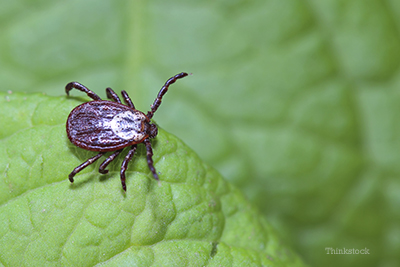
As we enter the warm weather season, it is difficult to remember that just a few months ago parts of our country were experiencing record snow fall totals and cold temperatures. Despite this brutally cold and snowy winter across much of the Northeast and mid-Atlantic, experts say tick populations across both regions will be thriving this summer.
The recent, below-average temperatures aren’t likely to make a dent in the local tick population, says Aislinn Sarnaki of the Bangor Daily News. According to Maine tick experts, “They’ll be out as soon as it warms up.”
Thomas Mather, co-founder and director of the University of Rhode Island Tick Encounter Resource Center says, “…dog ticks are probably up at least a third over what we saw last year [at this] same time." The quote appears in an AccuWeather article by Jillian MacMath. MacMath also reports that Mather’s resource center performs a crowd sourced tick survey across America, and receives between 90 and 150 requests per day to identify different types of the parasite. Mather has said, "What we're seeing over the last few weeks has been a virtual explosion compared to [the] last year of American dog ticks in the mid-Atlantic and New England area."
What diseases do ticks carry?
There are three types of ticks that are of greatest concern in the mentioned regions. They are:
- The American Dog Tick (Dermacentor sp.) — Carries infections causing Rocky Mountain spotted fever and others
- Black Legged Deer Ticks (Ixodes sp.) — Carries infections causing Lyme disease and others
- Lone Star Ticks (Amblyomma sp.) — Carries infections causing ehrlichiosis and others
Why didn’t the harsh winter kill off the ticks?
It is likely that this winter's abundance of snow helped to keep the ticks and small rodents warm. Small rodents serve as the host for the immature stages of ticks. Snow works as an insulator from low temperatures.
Meteorologist Ben Noll told MacMath that, "In the mid-Atlantic, it was the second coldest February of all-time in Pennsylvania, 6th coldest in Maryland and New Jersey and 7th coldest in Delaware and Virginia, which also contributed to keeping snow on the ground for long periods of time."
How to prevent ticks from feeding on you and your pet
- Wearing repellent-impregnated clothing may help to protect against tick bites. The CDC recommends that people use products that contain “permethrin” on clothing, and repellents containing DEET on exposed skin. However, DEET is not safe for pets. If you are using a DEET product, make sure that your pet does not lick your skin. Also make sure that your pet’s skin is not exposed to DEET as he may lick or chew on himself.
- It’s a good idea for people and pets to avoid heavy brush areas and to walk in the middle of trails.
- Your veterinarian will be able to offer you the best parasite preventives for your pet.
Click here to learn more about parasite prevention and screening in dogs and don't forget to include regular parasite screening during your dog's regular checkups.
If you have any questions or concerns, you should always visit or call your veterinarian -- they are your best resource to ensure the health and well-being of your pets.
